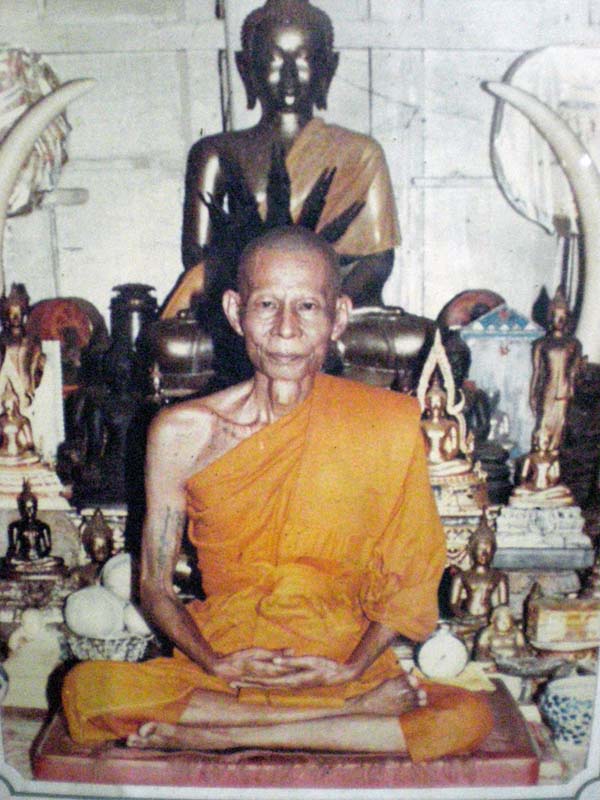𝐁𝐢𝐨𝐠𝐫𝐚𝐩𝐡𝐲 𝐨𝐟 𝐋𝐮𝐚𝐧𝐠 𝐏𝐨 𝐏𝐫𝐨𝐦, 𝐖𝐚𝐭 𝐊𝐚𝐧𝐨𝐧 𝐍𝐞𝐮𝐫, 𝐀𝐲𝐮𝐭𝐭𝐡𝐚𝐲𝐚 𝐏𝐫𝐨𝐯𝐢𝐧𝐜𝐞
Luang Po Prom was born on October 20, 1913, the second of nine siblings in a modest Thai village. At his birth, an astrologer foretold he would grow into a person of profound spiritual importance. Under the guidance of his father, Mr. Suwan, who was skilled in traditional spiritual practices, he learned ancient Thai magic, known as "Wiccha," a form of sacred knowledge passed down from teacher to student.
Mr. Suwan was a disciple of renowned monks, including Luang Po Kan of Wat Nok Gra Jaap and Luang Po Suk of Wat Makam Tao, and was proficient in powerful spells such as Kong Ka Pan (invincibility), Maha Ut (protection from harm), black magic removal, and Thai astrology.
Lp Prom showed exceptional responsibility and compassion, traits that earned him the trust of his village even as a child. By age 15, he had created his own herbal talismans, which were put to the test when his friends avoided injuries during a fight at a village fair, thanks to these protective items.
His reputation for spiritual power grew rapidly, and when the infamous “Tiger Gang” of robbers threatened his village, villagers looked to him for protection. The gang, known for their own magical invincibility, called off the attack after learning they’d face this young boy with spiritual strength.
At 23, on March 6, 1936, Prom became a monk at Wat Kanon Neur. His spiritual reputation had already attracted followers who donated generously to support the temple’s restoration.
His abbot, Arjan Chum, encouraged him to expand his spiritual learning. This led him to study with revered monks such as Luang Po Kan, from whom he learned the art of creating talismans using sacred knots, and Luang Po Am, an expert in Wiccha Khmer (ancient Khmer magic).
Luang Po Am taught him how to practice Wiccha for healing and mind-reading, skills essential for a monk's role in caring for the sick and guiding people.
The alchemical teachings of Luang Po Am were particularly transformative for him. This branch of Wiccha involved manipulating natural elements through meditative concentration.
Lp Prom learned to make objects float, demonstrating mastery over earthly elements an ability seen as symbolic of profound spiritual achievement. Another skill Luang Po Am taught him was “haste walking,” a technique that enabled monks on Tudong (forest pilgrimage) to traverse great distances quickly, an ability useful in both spiritual and practical contexts.
In 1951, Luang Po Prom consecrated his first batch of sacred amulets. These talismans, adorned with images of deities such as Narai (an incarnation of the Hindu god Vishnu known for protection and justice), Hanuman (the monkey god symbolizing courage), and Singha (the lion symbolizing power and protection), gained popularity for their reputed spiritual potency. His father had imparted to him the methods for creating these amulets, and his consecrations were highly regarded for bringing blessings, safety, and prosperity to their wearers.
Many legends arose around the miraculous effects of his amulets, particularly those from the 1959 Narai series. One famous story involves a boatman named Tai, who was attacked by robbers while transporting passengers. Tai was shot but survived unscathed, protected by his Narai amulet. Another account tells of a boy struck by lightning while herding cattle. Though his metal belt buckle melted from the strike, he was unharmed—a miracle attributed to his Narai amulet.
On January 27, 1991, Luang Po Prom passed away, but his spiritual impact endures. His body, preserved in a glass coffin at Wat Kanon Neur, continues to draw devotees who honor his legacy. His amulets, considered treasures of great merit, are still believed to offer protection and blessings to wearers, safeguarding them from physical and spiritual dangers.
Today, his disciples create amulets to honor his memory. Those who acquire one of his amulets are encouraged to perform acts of merit as a way of giving back, recognizing the power and wisdom he imparted to the world.
